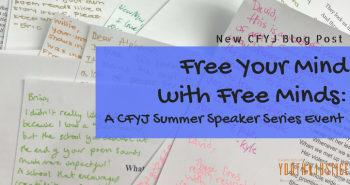Free Your Mind with Free Minds: A CFYJ Summer Speaker Series Event

By Jasmine Awad, Policy and Legal Fellow
“Before Free Minds, I didn’t know how to read.”
The Campaign for Youth Justice recently kicked off their 2018 Summer Speaker Series by hosting a “Write Lunch”, a tailored version of Free Minds Book Club & Writing Workshop’s “Write Night,” where community volunteers gather alongside Free Minds Poet Ambassadors home from prison to provide feedback on the writing of Book Club members who are still incarcerated.
The Summer Speaker Series at CFYJ gives DC interns working in the juvenile justice space an opportunity to network with each other, while learning about topics they are passionate about from different organizations. We were fortunate to meet with Mbachur Mbenga, AmeriCorps Vista & Outreach Coordinator; James Allen, Reentry & Outreach Assistant; and Anthony, a Poet Ambassador from Free Minds.
Free Minds, which held its first Book Club Session in 2002, is an organization that uses books, creative writing, and peer support to give DC youth incarcerated as adults the opportunity to discover their own potential and talent. Mbachur shared Free Minds’ mission statement and origination, noting that Glen Charles McGinnis was known as the Original Free Mind. Free Minds Co-Founder Kelli Taylor was inspired by Glen when she learned how impactful books were for Glen during his time in prison, and sent him books that they could then discuss together through letters.
Unfortunately, incarcerated people are very limited in how they can spend their time. Reading and writing can make a huge difference for them, as they can gain the ability to learn and grow through personal means. Anthony noted that prior to incarceration, he was able to reach high school without being taught how to read. Upon learning about Free Minds during his time incarcerated, he had the ability to join a group of other incarcerated men and spent a lot of his time learning, noting that, “Before Free Minds, I didn’t know how to read.”
This value placed on education and inspiration through books is extremely significant, especially given the recent threats to block access to books at prisons across the country, such as in New York, Virginia, California, and Florida. Luckily, federal prison officials rescinded the ban on publishers, bookstores, and book clubs from sending books into prisons. Prior to the reversal of the ban in May 2018, Free Minds Co-Founder and Executive Director Tara Libert commented on the ban, saying, “You shouldn’t have to be rich to read.” Reading material was sent back to her from two California prisons, and Free Minds had to put a halt on shipping more books to other facilities, making it challenging for incarcerated men to read inside the facilities.
Free Minds doesn’t only offer books to incarcerated individuals: The Federal Prison Book Club also sends discussion questions, book review assignments, and gives incarcerated men who have turned 18 years old and were transferred to a federal prison the opportunity to write creatively. Through this, incarcerated individuals can write poetry, and in turn, Free Minds hosts monthly “Write Night” events, so volunteers can write feedback for the incarcerated poets. At our “Write Lunch” event, we were given the opportunity to read many different poems and leave encouraging feedback in different colored pens to brighten up the papers.
Initially, as we started reading the poems, the (very packed) room was silent, but it didn’t take long for people to start reacting out loud to the poetry. “This is genius, you have to read this one,” said one intern. “I love that this one is directed to his mother, specifically,” said another. We were able to connect with the poets on different emotional levels, so much so that we all lost track of time because we just wanted to keep reading more. Many times, people can underestimate the abilities of those incarcerated, and Free Minds not only inspires people in prison to continue writing, but can also teach volunteers outside of facilities that perceptions of those incarcerated aren’t always true. This wasn’t my first interaction with incarcerated youth to know that they are extremely intelligent and inspirational, but reading those poems had even inspired me to write, myself:
Inside, Out
My breath escapes,
As I continue to be exposed
To their experiences on the inside.
My mind wanders,
As I continue to educate
The mentalities on the outside.
My motivation intensifies,
As I continue to learn
Of their strength on the inside.
My devotion increases,
As I continue to meet
Other advocates on the outside.
My passion grows,
As I continue to concentrate
On bringing the inside, out.
Trust me, the writings of these young people are much more powerful and inspirational. If you’re interested in reading some of the poetry from these talented people yourself, I strongly recommend picking up a copy of “The Untold Story of the Real Me,” the second book that Free Minds put together that highlights a collection of poems written by young people who were charged and incarcerated as adults at the age of 16 or 17. There is also an easily accessible poetry blog that’s updated frequently with new poems. Be empowered by the young voices from prison -- I know I sure am!

